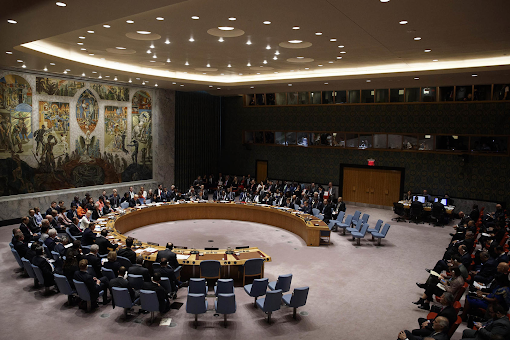UN Security Council calls for ceasefire - will it make a difference?
The United Nations Security Council has passed a resolution demanding an immediate ceasefire in the Israel-Gaza conflict.
The wording of the resolution is significant. It calls for a ceasefire during the month of Ramadan and demands the release of all hostages currently held by Hamas. The resolution is not binding on Israel, but it sends a very clear signal that Israel is becoming increasingly isolated.
Perhaps more significantly, the US's decision to abstain from the vote rather than use its power as a permanent member to veto it - as it has on three previous occasions - would appear to suggest a shift in both US policy and Israel's ability to control the narrative.
International goodwill for Israel following the Simchat Torah atrocities has largely evaporated as a result of Israeli Prime Minister Benjamin Netanyahu's offensive on Gaza. The military operation has had limited success in achieving its supposed objectives, but has served to solidify feeling critical of Israel's actions with the reported death toll now exceeding 32,000 and over 80% of Gazans displaced.
The US has come under increasing pressure to use its influence to limit Israel's offensive, so is this a sign that such pressure is making a difference? Perhaps, although I am not entirely convinced. While the US doesn't want to be seen as consistently opposing calls for an immediate ceasefire, making a potential hostage deal part of the package and ensuring the resolution contains criticism of Hamas allows them to back down a little without needing to lose face - crucially, without really changing policy.
But it is clear that Israel is not in control of the situation, and is certainly not acting in ways that make it easy for the US to continue to offer uncritical support.
Will this resolution make any difference? On its own, probably not. It certainly will not halt Israeli military action in Gaza; historically, Israel has often viewed the UN as having a pro-Palestinian bias, largely ignoring it. But as part of a wider international statement this can, and does, signal a strengthening of world opinion. It is a rare thing for the US to abstain on a resolution critical of Israel, which suggests that it is making a statement here: Israel is being told, in no uncertain terms, that the US is running out of patience.
Israel is rapidly losing support and, contrary to what Netanyahu's fighting talk indicates, is not achieving very much through its expensive and destructive military offensive. Its aim to liberate captives has so far been an abject failure. There are few outside Israel who believe the military operation is working and many within Israel are questioning the wisdom of Netanyahu's intransigent approach. The Prime Minister is undeniably an obstacle to peace and defying UN resolutions will merely help confirm his status as someone actively working against peace stability. Perhaps - just perhaps - this resolution represents just one more small step in turning the attitudes of Israelis against their own government's ill-conceived and counter-productive military campaign, which is proving more potentially destructive to Israel than it is to Hamas... which in turn may represent another small step on the route to peace.
Where Israel has failed most badly is in its public relations mission. Israel has a well-oiled propaganda machine that has tried, and failed, to sell its official line. Like the Iraqi information minister Mohammed Saeed al-Sahhaf, who became known as Comical Ali for his unconvincing pronouncements, no-one now takes any official statements from Israel seriously. Certainly, few believe that “Israel is committed to minimising civilian harm and abiding by international law”.
So, will this resolution make a difference? My own view is that it is the product of both a changing situation and changing attitudes, and that Israel's government should take note. It could well mark a turning point in this conflict.

Comments